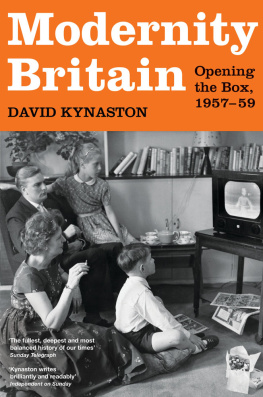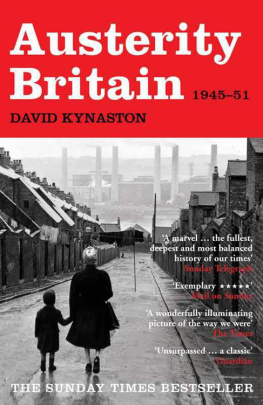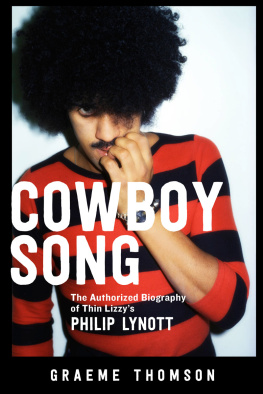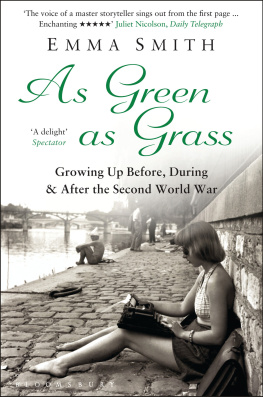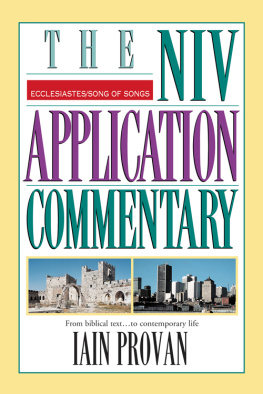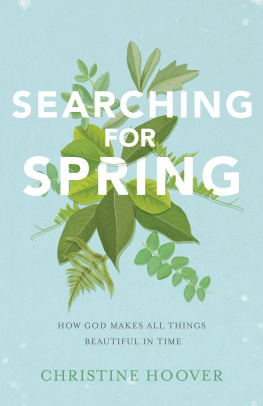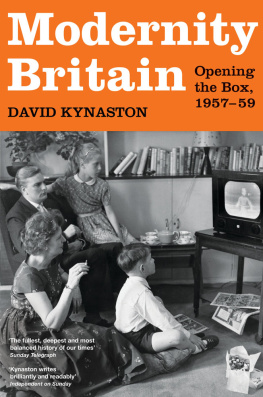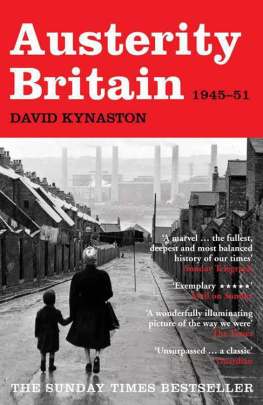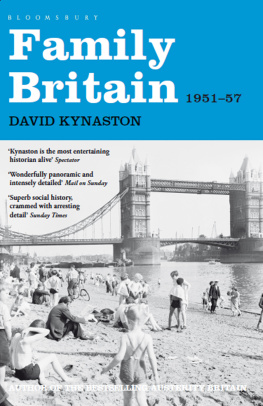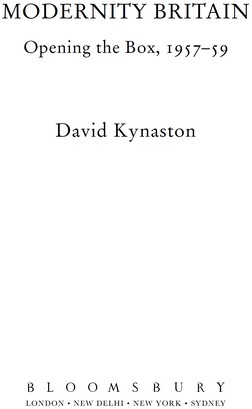
Contents
Tales of a New Jerusalem is a projected sequence of books about Britain between 1945 and 1979. The first two, A World to Build and Smoke in the Valley , are gathered together in the volume Austerity Britain ; the next two, The Certainties of Place and A Thicker Cut , in the volume Family Britain . Accordingly, Opening the Box is the fifth book in the sequence, and in effect comprises the first half of the volume Modernity Britain , which is intended to cover the years 195762.
This book is dedicated to Lucy
Council tenants and potential council tenants are today a much more typical section of the population at large than ever before, declared a junior housing minister, Enoch Powell, to the annual conference of the Society of Housing Managers on Thursday, 10 January 1957 at almost exactly the moment that Harold Macmillan was calling at the Palace to succeed Sir Anthony Eden as the new Conservative prime minister. Later that afternoon, discussion turned to the nonconformists. I find that, generally speaking, there is no cause for complaint about the standard of decoration of those tenants who defy regulations and do their own, conceded Lambeths director of housing, Mr C. C. Carter. They carry out the decorations to a standard which is usually very satisfactory. I am not sure whether the day has not arrived when you might well let tenants do their own internal decorations. Next days main address was given by Mrs E. Denington, vice-chairman of London County Councils Housing Committee. I think that the natural way for people to live is in houses, she insisted. I should like to sound a word of warning to authorities which are thinking of building flats. I believe that no more than 5 per cent of the population want to live in flats. Do not build them unless you have to, and if you have to then do make provision for children, because if you do not you have no right to grumble if they are a nuisance.
Judy Haines as usual was at home in Chingford on Saturday the 12th. Fed up, she noted flatly. Girls went to pictures, John [her husband, earlier known as Abb] to London, and here I am. Decided to please myself and blow housework. Therefore I enjoyed some needlework Pamelas frock and curtains. Another diarist, Allan Preston, the 25-year-old son of an English teacher, went to Burnden Park in the afternoon. The first half was very entertaining, he recorded of the home teams First Division clash with Leeds. Both sides attacked crisply and at half time Bolton were winning 42. The second half was more dismal. Two goals only were scored and there were one or two unpleasant incidents. Stay-at-homes could have watched Percy Throwers Gardening Club and The Lone Ranger on BBC television, while 7.30 saw another favourite, Dixon of Dock Green , back for his third series. The whole family has been eagerly waiting for the return of Dixon, reported a viewer, and judging by this edition [characteristically called Give a Dog a Good Name] this series is going to be every bit as good as the last. Hancocks Half Hour by this time was on both radio and television, and on Sunday evening the Light Programme broadcast Almost a Gentleman, episode 14 of the fourth radio series: overlooked once again in the New Years Honours List, the anti-hero of 23 Railway Cuttings, East Cheam is persuaded he needs etiquette lessons, with predictably disastrous results. Perhaps revealingly, Philip Larkin seems never to have evinced any interest in, let alone enthusiasm for, Tony Hancock. An utterly lonely Sunday, spent indoors except for the usual excursion to the pillar box, Larkin wrote from his flat in Hull later that evening to Monica Jones in Leicester. I have sat doing nothing since about 4 o clock, & am now slightly drunk on rum and honey & hot water. The usual revolting insufficient meals an awful tinned steak pudding, like eating a hot poultice, & sausages... I cant ever remember being so dead since about 1947.
Top People Take The Times was a new poster from Monday the 14th, as the PM sought to finalise his administration. Many considerations had to be borne in mind, the Old Etonian (like his predecessor) would reflect after a difficult process. The right, centre & left of the party; the extreme Suez group; the extreme opposition to Suez; the loyal centre and last, but not least, U & non-U (to use the jargon that Nancy Mitford has popularised), that is, Eton, Winchester, etc. on the one hand; Board school & grammar school on the other. Top people also had to face the cameras, and Macmillan on the 17th found himself on fraught terms with the new-fangled teleprompter as he gave a ministerial broadcast. Reactions were mixed. In its extremely clear intimation that we were neither a second-rate power nor a satellite [i.e. of the USA], it gave me a lift of the heart such as I had never hoped to experience again, wrote the once-Marxist novelist Patrick Hamilton to his brother. But a 67-year-old housewife in Barrow, Nella Last, was appalled to read next morning in her Daily Express about Macmillans apparent promise to move decisively towards what she called free trade with Europe: Im not either clever or well read, I dont cant decide the issues of such a step, BUT I do disagree utterly with one man coming to a T.V. screen, & calmly announcing such a step... As I tidied round I thought that many cleverer heads than mine would feel the same sense of shock! Labours television guru Anthony Wedgwood Benn was abroad, but heard disturbingly favourable reports on his return. His television performance was evidently a very dramatic one, Benn noted. His call for an opportunity state has created interest and discussion just when things looked so soggy in his own Party. The Edwardian actor-manager was indeed not someone to underestimate, though Malcolm Muggeridge soon afterwards had a bit of fun in Life . The lean, sinewy neck pulsates, he told his American readers, the tired grey features wear a smile; the voice, soft and sibilant, emerges from the drooping moustache. A publisher? No. A civil servant? No. A Prime Minister.
Modelled on the Parisian jazz club Le Caveau, the Cavern opened in Liverpool the evening before Macmillans broadcast. Nearly 2,000 people queued outside, only 600 were able to get in, and (reported a local paper in a brief story about Liverpools New Jazzy Club) dressed in jeans, skirts and sweaters, they filled every corner of the club, standing packed between the bricked arches, as they listened to various jazz bands plus the Coney Island Skiffle Group. The foreign influence was spreading. The snack bar near Kew Gardens station was crowded out, noted the solipsistic, emotionally impenetrable civil servant Henry St John on Saturday the 19th. There seem no times or seasons for anything now; people seem to fill cafs day and night, whereas they used to be almost deserted except at meal times. The old insularity was also starting to go in football, with Manchester United the first English team to take part (in defiance of the football authorities) in the European Cup and soon afterwards on 6 February beating Bilbao 30 to reach the semi-finals. Next days Listener reviewed Lawrence Durrells novel Justine , the first volume of what would become an exotic literary phenomenon, The Alexandria Quartet . Less fiction than incantation, reckoned Ronald Bryden, beautifully conceived, only too consciously beautiful in the writing. Durrell himself lived in Provence and was fond of calling England Pudding Island, a view that in certain moods the young American poet Sylvia Plath (recently married to Ted Hughes) shared. It is often infuriating to read the trash published by the Old Guard, the flat, clever, colorless poets here, she wrote back home a few days earlier. Little was as unashamedly English as At the Drop of a Hat , the musical revue by Michael Flanders and Donald Swann playing since 24 January to packed houses at the Fortune Theatre. None of their songs are very melodious and not all of them are really amusing, grumbled Anthony Heap, local government officer in St Pancras and inveterate first-nighter, but Harold Hobson in the Sunday Times relished the kindly satire and the crisp, neat, elegant, cultured jokes about gnus, bindweed, the monotonous lot of the umpire in the Ladies Singles at Wimbledon, the very contemporary furniture of his flat, and the disastrous season of 1546 in the English theatre. Flanders (bearded and in a wheelchair) had, Hobson added, an inner merriment which, when he is not speaking, communicates itself to the audience.
Next page
